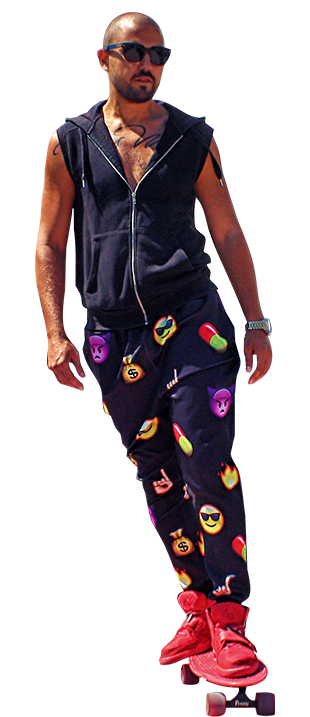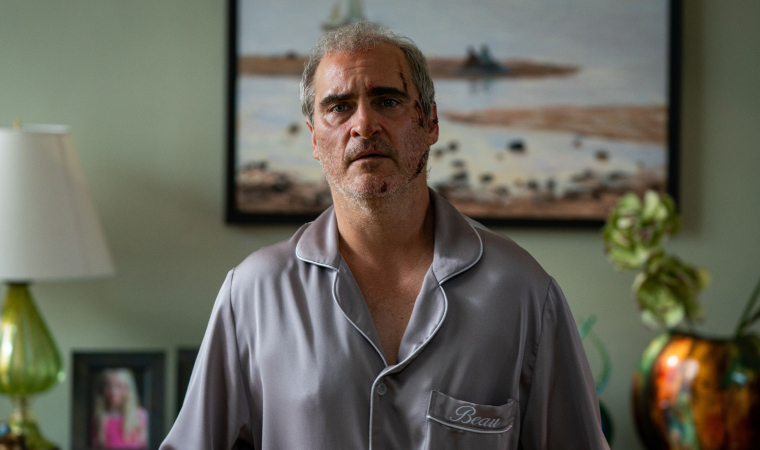
Joaquin Phoenix in a scene from "Beau Is Afraid." Photo courtesy of A24.
Movies are like houses. They can be cozy and inviting, or dark and cavernous. So it falls to the film reviewer to give prospective buyers a tour of the property, with one major difference from a real-life Realtor: we're going to be brutally honest about what works and what goes beyond a fixer-upper issue.
The film-as-real-estate comparison, a handy go-to when explaining the nuts and bolts of critiquing a movie, springs to mind when it comes to “Beau Is Afraid.” The new A24 release, the third feature by “Hereditary” and “Midsommar” auteur Ari Aster, sets itself apart by its use of spaces and their prominent role, be they an aggressively shabby big-city apartment, a suburban abode where cheerful décor attempts to conceal desperate lives, a theater commune's colorful stage in the middle of a forest, a plush mansion with an imposing chestnut-colored spiral stairwell as its centerpiece, and a treacherous body of water with a most unexpected function.
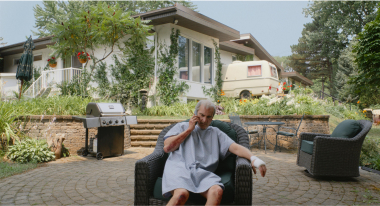
Joaquin Phoenix as Beau in a scene from Ari Aster's "Beau Is Afraid."(Photo by Takashi Seida/A24 Films)
Drifting through these spaces is Beau Wassermann (Joaquin Phoenix), a bundle of nerves fidgeting his way into his late 40s, though those tufts of gray hair remaining on his head make him look older. Like the title points out in Aster's trademark deadpan humor, Beau most definitely lets fear lead the way. It's there in his perenially widened eyes, certain that everyone is out to get him. “Actually,” Aster appears to point out in almost every scene, that's because it's true, and I'm going to do my damnedest to sustain that jittery paranoia. For three whole hours.”
Phoenix heads a solid cast in a story that prefers to live outside the box, a bruising and blistering portrait of Jewish angst, bent in the shape of a hero's saga: Odysseus with deep-seated mommy issues, a hankering for antidepressants and a really dowdy wardrobe. On paper, it represents an ambitious step forward for a filmmaker acclaimed for his meticulous set design and a knack for mining a sense of unease out of his audience. Big cinema that aims for the rafters and goes for broke. V-I-S-I-O-N-A-R-Y in big block letters.
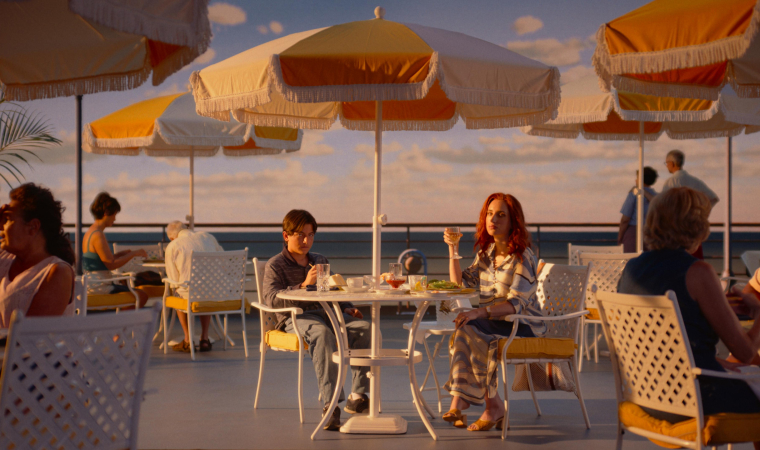
Armen Nahapetian and Zoe Lister-Jones in a scene from "Beau Is Afraid." Photo courtesy of A24.
But Aster, unafraid of tackling big ideas and trusting the audience to keep up with his nervy dream logic, can't get out of his own way. His ambition is outmatched by a dark void where one would expect empathy to be. He looks down on his hapless protagonist, intent on making the viewer experience the world from his distrustful, unremittingly negative vantage point while denying him the dimensions that would add interesting wrinkles to his neuroses. It's a particular kind of cruelty Aster trades in, coupled with disdain and inflicted from an icy distance. Kindness is avoided at all costs, to a degree that one begins to wonder if the director knows the meaning of the word.
The story, a corrosive inversion of the love between a mother and her son, kicks into gear when Beau's attempt to make his flight in order to visit his mother Mona (Patti LuPone) is foiled by a series of chaotic events that unfold with the rug-pulling logic of a vivid nightmare. Beau then learns Mona was the victim of a grisly freak accident. Mayhem ensues on his end, successful in making viewers feel like they've been physically assaulted.
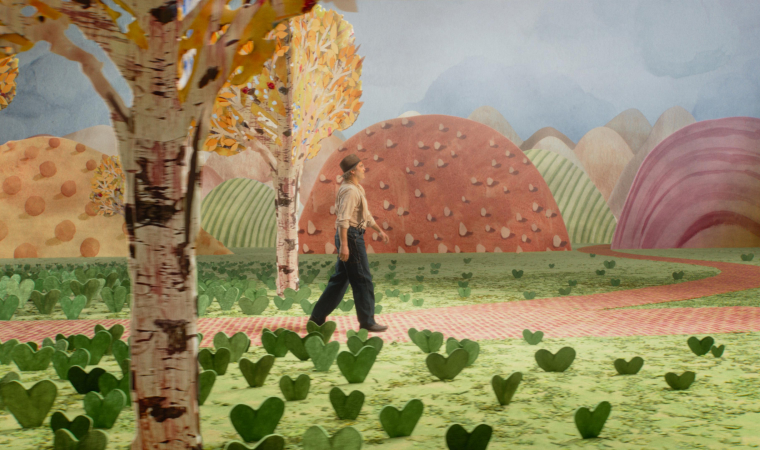
Joaquin Phoenix in a scene from "Beau Is Afraid." Photo courtesy of A24.
This is all meant to be funny, but it's pretty hard to laugh when you feel like you're getting mugged. It frequently feels as if Phoenix's committed, fully felt performance, which appears to take Beau's pain (physical and emotional) seriously, is operating on one level, whereas Aster's relentless tendency to point his finger and make fun of Beau's predicament operates on another level. The disconnect is crippling. Much has been made of the film's inflated running time, but it's more of a symptom than the source of the problem. It's pretty clear “Beau Is Afraid” would be a tough slog at any length for viewers who can't stand Aster's gallows sensibility, just as much as it's likely to be enjoyed by Aster fans who are on his twisted wavelength. (Case in point: the commercial preview I attended was a study in contrasts between viewers who guffawed at Aster's hamfisted jabs at Phoenix's expense and those who sat in stony “WTF” silence.)
The running time in this case is a reflection of the director's hubris. Call it malicious chutzpah. And yet, “Beau Is Afraid” is the kind of turd sandwich that can't be easily dismissed. Beau is saved from meeting an untimely end by a eerily chipper couple, played by Amy Ryan and Nathan Lane, who take him to their home, a kitschy setting that appears to have been borrowed from one of François Ozon's cheeky comedies. There's even Ozon regular Denis Ménochet on hand as a mentally unbalanced friend of the couple's late son, an Army soldier who, as his parents tell Beau, died in combat in Caracas. This section of the film is pretty insufferable, but at least it's not punishingly insufferable like what has preceded it.
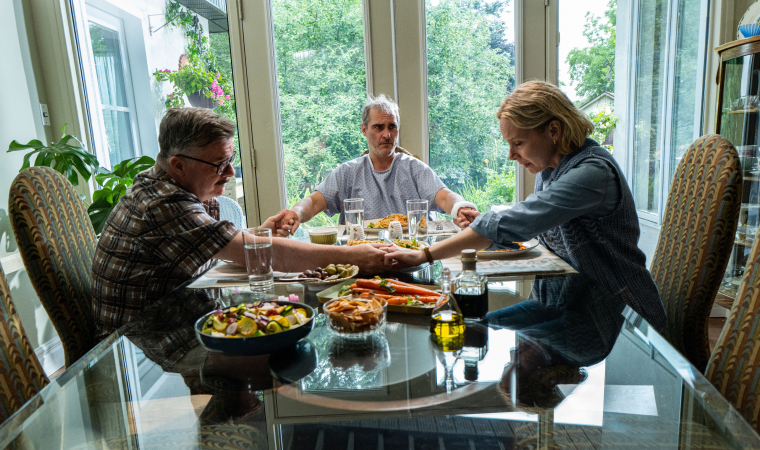
Nathan Lane, Joaquin Phoenix and Amy Ryan in a scene from "Beau Is Afraid." Photo courtesy of A24.
The next section of “Beau Is Afraid,” which finds the dazed journeyman lost in the forest, is the closest the film comes to being remotely watchable. Aster uses an outdoors stage and the trappings of theater to spin a yarn concerning a father, his loving family and a cataclysm that wrests them apart. The director also weaves in flashbacks that peek into Beau's childhood, including a glimpse into puppy love and what may or may not be a traumatic event embedded into a recurring dream. These moments are short-lived, but they suggest the movie that might have been without Aster's virulent prodding.
The surreal flourishes throughout “Beau Is Afraid” occasionally recall “Mulholland Drive,” but without the benefit of David Lynch's gripping mystery narrative. More frequently, though, it becomes apparent that Aster is stepping into territory covered by Charlie Kaufman, who wrote “Being John Malkovich” and directed “Synecdoche, New York” and Netflix's “I'm Thinking of Ending Things.” Instead of romantic relationships, which have been one of Kaufman's obsessions, Aster zeroes in on parental dysfunction, but as in “Hereditary” and his reprehensible 2011 short, “The Strange Thing About the Johnsons,” warmth is supplanted by contempt.
The sheer scope of Aster's opus exacerbates the off-putting chill, giving him free rein to spread his glib worldview however he sees fit, an opportunity that feels thoroughly unearned, even more so with A24 billing this debacle as an immersive experience best seen on an IMAX screen. (Please don't shell out $20-plus for this.) Not even a volcanic monologue delivered by LuPone late in the game, or a reasonably clever variation on a trial by one's peers, can salvage things. Because this is the kind of film that reduces its characters to sickening punch lines, then demands that you marvel at the technical prowess on display. To those of us who want to feel something other than disgust when seeing a movie about a guilt-riddled mother-son bond, “Beau Is Afraid” keeps pouring salt on an open wound. It revels in daring you to hate it. At least on that end, mission accomplished.
“Beau Is Afraid” is now playing across South Florida, including IMAX engagements at AMC Aventura and AMC Sunset Place.




